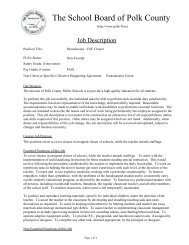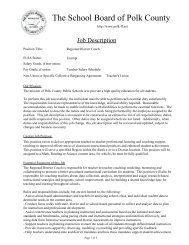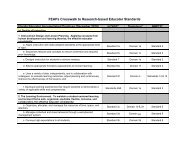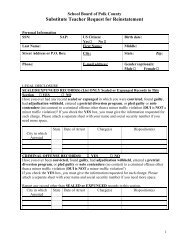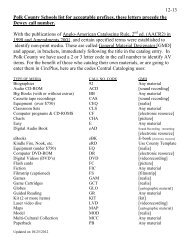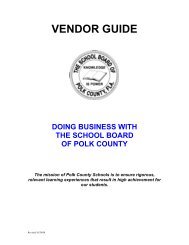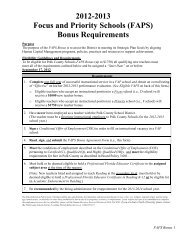Teacher Evaluation System - Polk County School District
Teacher Evaluation System - Polk County School District
Teacher Evaluation System - Polk County School District
Create successful ePaper yourself
Turn your PDF publications into a flip-book with our unique Google optimized e-Paper software.
Requirements for Consistency in Evaluator Rating Processes<br />
In order to ensure consistency among school evaluators pertaining to rating processes applied to the<br />
evidence‐based practices derived from contemporary research it is essential that the uniform set of<br />
rubrics be used to determine those ratings. These practices are organized in a framework that provides<br />
a common language to ensure a focused effort to improve learning, for both students and the adults in<br />
our school system. The framework includes 4 Domains, 23 EPCs and multiple descriptors within each<br />
EPC. This framework also provides information pertaining to the relationship of the EPCs to the Florida<br />
Educator Accomplished Practices and the Marzano <strong>Evaluation</strong> Model. The framework includes the<br />
identification of possible data sources that may be used as evidence for potential ratings as well. The<br />
evaluator must use the set of rubrics delineated in the framework when determining the presence and<br />
quality of teacher practices consistent with contemporary research in order to assign a fair and<br />
equitable rating for each of the 23 EPCs. In essence, ratings for the EPCs must be based on credible<br />
data examined through observations, conversations, other possible sources of evidence, and a variety<br />
of other means that occur throughout the entire school year. There is no expectation or requirement<br />
that a portfolio be developed and submitted to the administrator.<br />
The Importance of Feedback to Improving Performance<br />
There is significant evidence that effective feedback is a critical element of any process designed to<br />
improve performance. It is essential that school administrators apply the mechanisms, with fidelity, for<br />
providing meaningful feedback and support for professional learning that are built into the district’s<br />
teacher evaluation system processes. The system is designed to enhance the focus on student learning<br />
and to increase the conversations among staff related to teacher practices that will lead to that<br />
enhanced learning. That design will not be effective toward achieving the goal of student learning<br />
growth unless school administrators and teachers engage in the processes with commitment and<br />
quality. Professional conversation and reciprocal feedback will ultimately determine the success of our<br />
students. <strong>System</strong> processes must be implemented as designed. In order to enhance the feedback and<br />
communication process and in accordance with the requirements of the Student Success Act 2011, the<br />
administrator must discuss the teacher’s overall annual performance evaluation with the teacher in a<br />
face‐to‐face conference. In addition, it is the responsibility of the administrator to provide both<br />
developmental and evaluative feedback to the teacher throughout the year based on varied<br />
interactions and observations as described in earlier sections of this system. Likewise, it is the<br />
responsibility of the teacher to seek developmental and evaluative feedback from the administrator as<br />
may be appropriate.<br />
28



